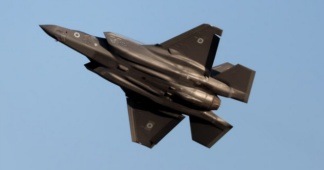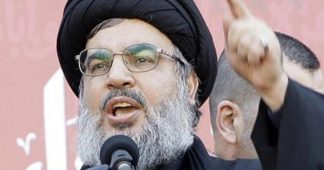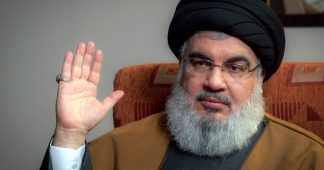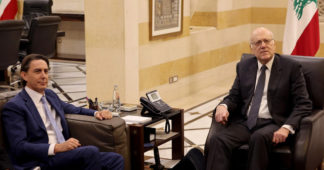The Lebanese movement vows to ‘continue its jihad’ against Israel and to support people in Gaza and the occupied Palestinian territories
Sep. 28, 2024
Lebanon‘s Hezbollah confirmed on Saturday that its leader, Hassan Nasrallah, was killed after Israel launched a series of air strikes on the Lebanese capital, Beirut, a day earlier.
In an assassination that risks triggering all-out war in a region already on the brink, Israeli fighter jets dropped approximately 10 bunker-busting bombs on residential buildings in Beirut’s southern suburbs, an area colloquially known as Dahiyeh, on Friday.
Footage seen by Middle East Eye showed thick plumes of smoke rising from the blast site.
The Israeli military immediately confirmed it was behind the strikes and initially claimed it targeted Hezbollah’s command centre. Later, Israeli media reported that Nasrallah, 64, was the intended target of the strikes, but did not confirm his death.
On Saturday, the Israeli army posted a message on X, saying: “Hassan Nasrallah will no longer be able to terrorise the world.”
The Arabic spokesman of the Israeli army, Avichay Adraee, also said in a statement on X that Nasrallah was killed alongside Ali Karki, the commander of Hezbollah’s southern front, as well as a number of other commanders.
“The message is clear: we will reach everyone who threatens the citizens of Israel in the north, in the south and on more distant fronts.”
Later, Hezbollah said in a statement: “His eminence, the master of resistance, the righteous servant, has passed away to be with his lord who is pleased with him as a great martyr.
“The leadership of Hezbollah pledges… to continue its jihad in confronting the enemy [Israel], supporting Gaza and Palestine and defending Lebanon and its steadfast and honourable people.”
The statement did not mention who would succeed Nasrallah or how the group would respond to the assassination of its long-time leader.
According to analysts, the man widely regarded as Nasrallah’s heir, Hashem Safieddine, was still alive after Friday’s attack.
Safieddine, who oversees Hezbollah’s political affairs and sits on the group’s Jihad Council, is a cousin of Nasrallah. Like Nasrallah, he is a cleric and descendant of the Prophet Muhammad.
The US State Department designated Safieddine a terrorist in 2017, and in June, he threatened a big escalation against Israel after the killing of another Hezbollah commander.
Khamenei urges Muslims to confront Israel
Earlier on Saturday, Iranian Supreme Leader Ali Khamenei urged all Muslims to stand by the people of Lebanon and assist Hezbollah in confronting Israel’s “wicked regime”.
He also urged all Muslims to stand alongside the people of Lebanon and Hezbollah and support them in “confronting the usurping and oppressive regime”.
“The fate of this region will be determined by the forces of resistance, with Hezbollah at the forefront,” he added.
Speaking to reporters in New York on Friday, US Secretary of State Antony Blinken reaffirmed Israel’s right to self-defence and said Washington would take “every measure” if its interests in the region were attacked.
“Israel has the right to defend itself against terrorism,” Blinken said.
“Anyone using this to target American personnel, American interests in the region, the United States will take every measure [against them],” he added.
Blinken’s remarks came shortly after Abu Alaa al-Walaei, a senior commander from Iraq’s Sayyid al-Shuhada Brigades, warned that if an all-out war broke out, his group would target US and Israeli interests in the region.
“Even the [United Arab] Emirates, which we consider the advanced site of the usurping entity, will be the first line of targeting,” Walaei said, according to the Hezbollah-affiliated Al Mayadeen website.
In an attempt to de-escalate tensions, a Pentagon spokesperson said the US did not have advance warning of the attacks. The spokesperson added that US Defence Secretary Lloyd Austin spoke with his Israeli counterpart as the operation was ongoing.
Who was Nasrallah?
Nasrallah’s killing could serve as a major blow to Hezbollah after the long-time leader oversaw the transformation of the group into a major political force both in Lebanon and the wider Middle East.
Born in 1960 to a poor Shia family from east Beirut’s Karantina, Nasrallah became head of Hezbollah’s executive council in 1985 as well as a member of its Shura Council.
In 1992, Hezbollah’s then-leader, Abbas al-Musawi, was killed in an Israeli air strike along with his wife and child. Speaking at his funeral, Nasrallah said: “We will continue this path… even if we are martyred, all of us and our houses demolished over our heads, we will not abandon the choice of the Islamic resistance.”
Nasrallah then took the reins of Hezbollah and soon after, the group began acquiring more sophisticated weaponry, including long-range rockets capable of reaching deeper into Israeli territory.
Under Nasrallah, whose surname translates to “victory through God”, Hezbollah grew from a local armed movement to the largest political party in Lebanon’s recent history.
In October 2021, Nasrallah said that Hezbollah had 100,000 fighters, making it also among the most powerful non-state armed organisations in the world.
He also maintained Hezbollah’s reputation throughout the Arab world as the only armed force to have successfully driven Israel to retreat from an Arab country.
The Hezbollah leader’s speeches would often attract the attention of the Middle East and beyond.
During his time as Hezbollah’s number one, Nasrallah also saw the further cementing of ties within Iran’s “axis of resistance”, which includes Hezbollah, the government of Syrian President Bashar al-Assad, the Palestinian movements Hamas and Islamic Jihad, the Houthi movement in Yemen and several Iraqi paramilitary groups.
Following Friday’s strikes, Hamas, Islamic Jihad, the Houthis and the Islamic Resistance of Iraq all released statements of condemnation against Israel.
“We renew our absolute solidarity with the brotherly Lebanese people and the brothers in Hezbollah and the Islamic resistance in Lebanon,” Hamas said in a statement.
“We share their pain and hope for victory over this Zionist enemy, and we value and commend their sacrifices and steadfastness in the epic of open accountability in support of our people and our resistance, and in response and defence of the brotherly Lebanese people.”
We remind our readers that publication of articles on our site does not mean that we agree with what is written. Our policy is to publish anything which we consider of interest, so as to assist our readers in forming their opinions. Sometimes we even publish articles with which we totally disagree, since we believe it is important for our readers to be informed on as wide a spectrum of views as possible.











